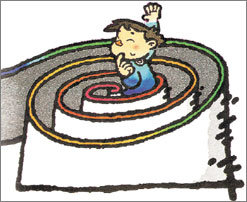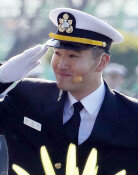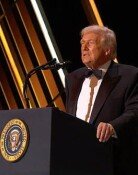Philosophy Education for Children
Philosophy Education for Children
Posted May. 09, 2005 23:21,

We should prevent accidents by openly revealing whats wrong.(Woo-shik)
The company must have reasons of their own . Have you never hidden your mistakes?(Ji-hee)
This is a scene from a Childrens Philosophic Education Laboratory classroom in Bongcheon-dong, Gwanak-gu, Seoul, on May 4. Five third-graders are engaging in a lively debate.
Discussing the topic, Unofficial recall of fire hazardous laundry machine from a newspaper article, they are debating the problem of revealing your mistakes truthfully.
During the 100-minute class, the children poured out various ideas and kept up a hot discussion. Of course, there is no right answer. The students, however, brainstormed the consequences of righteous behavior and practiced thinking about philosophical problems such as How much responsibility is involved in truth?
Development supervisor of the Childrens Philosophic Education Laboratory Lim Byung-gap said, Philosophy is not a high-flown thing but an educational process which redevelops common sense through everyday thinking and discovers creative answers, and added, If we nurture deep-thinking habits from childhood, they will display prudent judgment from problem-solving skills and also exhibit leadership.
Nearly 20 Professional Philosophy Institutions in the City Alone-
Children philosophy education, which became popular with parents in the mid-1990s, is regaining ground due to the effect of the recent college admission policies emphasizing creativity.
Schools have started in-depth supervision of reading, and mainstream universities such as Seoul National University are forecasting a weightier ratio on the admissions essay, contributing to the boom in philosophical education.
Childrens Philosophic Education Research Committee Wisdom Love representative Han Gi-ho said, After the announcement of the 2008 admissions policies, interest in philosophical classes is increasing again, and added, The number of students have increased by 30 to 40 percent from last years second semester.
The number of professional philosophy learning institutions (hak-won), of which only about two or three existed in the late 1990s, has recently proliferated to nearly 20 in the Seoul Metropolitan area. Large-scale reading guide businesses such as Hanuri are preparing for a philosophical education system.
Manager of the Childrens Philosophic Education Laboratory Park Min-gyu noted, The parents interest in philosophical education has skyrocketed due to admissions. Philosophical education for children is the consummate method to raise geniuses with the logical and critical thinking that society demands.
Teaching Kant and Socrates?-
Experts explain that early training in philosophy aids logical conversation and debating skills, fosters writing skills, rationality, leadership, and helps form proper values.
Kim Nam-sun (37, female, Seocho-dong, Seocho-gu, Seoul) who is philosophically educating her third grade child reported, Before, when I asked questions, the answer would be just because or I dont know, but now they try to find answers on their own and ask why? and how?
A philosophy class generally consists of four to eight peers in groups debating for 90 to 120 minutes. The supervisor only breaks the ice and leaves the children to find opinions and answers on their own. This is according to the conversation method, the core of philosophical rationality.
Han commented, The phenomena of elementary students receiving essay education is because of the admissions policies and there is not much difference in the purpose of philosophy or essay education. Essay education focuses on how to embellish the answer sheet rather than speculation on a problem while philosophy education teaches students how to handle problems.
Professor of Philosophy at Konkuk University Sung Tae-yong observed, You must not confuse children philosophy education with the teachings of Kant or Socrates, and said, Through philosophy education, you can dive into the logic of everyday curiosities and cultivate a critical and outstanding thinking attitude.
Some Criticize the Quality of Lecturers-
According to the Philosophy Class for Parents site at the philosophy education institutes homepage, there are many parents who leave messages expressing their pride in how children can now say what they think.
Advanced countries such as France are educating philosophy in standard education, but Korea, as of yet, still depends on private tutoring. For one class per week, the monthly educational fee is around 80,000 won.
In middle and high schools teachers of literature, ethics, or specialists are teaching philosophy. However, since elementary schools do not even have seminars on philosophical subjects for teachers, they must depend completely on private tutoring.
In addition, because of the philosophy education boom, institutes are blossoming and the question of quality is naturally arising.
Experts advise that even without hak-won, it is important for parents to treat their children as equals and encourage the basics of debate.
Manager of the KP Children Philosophy Academy Lee Jin-hee said, Philosophy education for children helps to keep their thinking from becoming isolated, and stressed, It is important to observe what your child is interested in and carry that curiosity to a higher level.
Jin-Kyun Kil leon@donga.com




![반찬통 착색 고민 끝…‘두부용기’ 버리지 말고 이렇게 쓰세요 [알쓸톡]](https://dimg.donga.com/c/138/175/90/1/wps/NEWS/IMAGE/2026/01/09/133126593.3.png)


